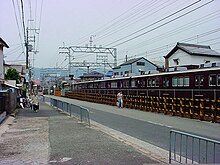Ishibashi handai-mae Station (石橋阪大前駅, Ishibashi handai-mae eki, station number: HK-48) is a train station located in Ikeda, Osaka, but is on the border with Toyonaka to the south and Minoh to the east. It serves as a transfer point for the Hankyu Minoo Line on one side and on the other side is an express station on the Hankyu Takarazuka Line.The station has five platforms connected by tunnels, two for Osaka-Takarazuka service, and three for Minoo service.
Ishibashi handai-mae 石橋阪大前 | |
|---|---|
 Umeda-bound Express at Ishibashi | |
| General information | |
| Location | Ishibashi Nichome, Ikeda, Osaka (大阪府池田市石橋二丁目) Japan |
| Coordinates | 34°48′29″N 135°26′44″E / 34.808152°N 135.445456°E |
| Operated by | Hankyu Corporation |
| Line(s) | |
| Other information | |
| Station code | HK-48 |
| History | |
| Opened | 1910 |
| Previous names | Ishibashi (until 2019) |


The station is near to one of the three campuses of Osaka University, though the campus is physically located in neighbouring Toyonaka City. The station is surrounded by bars, karaoke boxes, and izakaya restaurants along with more traditional small-stall shopping streets.
The word Ishibashi literally means Stone Bridge, referring to the old stone street bridge immediately north of the station over a small river that serves as the northern end of the shopping area, which is called Akai hashi.
Layout
editThere are three platforms with five tracks on the ground level.
| 1 | ■ Takarazuka Line | for Takarazuka, Kiyoshikojin, Kawanishi-noseguchi and Nigawa |
| 2 | ■ Takarazuka Line | from Takarazuka and Kawanishi-noseguchi for Umeda, Kobe, Kyoto and Kita-Senri |
| 3 | ■ Mino-o Line | mainly from the Takarazuka Line for Mino-o |
| 4 | ■ Takarazuka Line | from the Mino-o Line for Umeda, Kobe, Kyoto and Kita-Senri |
| 5 | ■ Mino-o Line | returning for Minoo |
History
editThe station opened concurrently with the opening of the Takarazuka Line and the Mino-o Line on 10 March 1910. Since then the structure of the station as an interchange of the two lines has not been largely changed except for the stretched platforms.[1]
On 25 June 1952, hours before the first scheduled train of the day, hundreds of protesters against the Korean War who left a meeting at the Osaka University campus thronged Ishibashi Station and forced station master to run a train to transport them to Osaka. After getting off the forcedly operated train at Hattori Station, they marched and burst into Suita Classification Yard of Japanese National Railways. As a result, more than one hundred people were arrested on charge of riot. The incident is called the Suita Incident.[2][3]
On October 1, 2019, the station was renamed from Ishibashi to Ishibashi handai-mae,[4]
Adjacent stations
edit| « | Service | » | ||
|---|---|---|---|---|
| Hankyu (HK-48) | ||||
| Takarazuka Line | ||||
| Hotarugaike (HK-47) | Local | Ikeda (HK-49) | ||
| Hotarugaike (HK-47) | Semi-Express (Osaka-umeda-bound only on weekday mornings) | Ikeda (HK-49) | ||
| Hotarugaike (HK-47) | Express | Ikeda (HK-49) | ||
| Toyonaka (HK-46) | Commutation Limited Express (Osaka-umeda-bound only on weekday mornings) | Ikeda (HK-49) | ||
| Jūsō (HK-03) | Limited Express (Nissei Express) | Kawanishi-Noseguchi (HK-50) | ||
| Minoo Line | ||||
| Terminus | Local | Sakurai (HK-57) | ||
| Hotarugaike (Takarazuka Line, HK-47) | Local (Osaka-umeda-bound only on weekday mornings) | Sakurai (HK-57) | ||
See also
editReferences
edit- ^ Hankyu Corporation (April 2001). Hankyū Station (in Japanese). Osaka: Hankyu Corporation. p. 33. ISBN 4-89485-051-6.
- ^ Mainichi Shimbun. 昭和毎日:吹田事件 - 毎日jp(毎日新聞) (in Japanese). Retrieved 2008-11-30.
- ^ The official record of the proceedings of the House of Representatives. No. 52, Local Administration Committee, 19th National Diet (April 27, 1954) (in Japanese)
- ^ "「大阪梅田駅」スタート 阪急と阪神梅田駅改称" [Osaka Umeda Station starts as Hankyu and Hanshin rename Umeda Station]. Osaka Nichinichi Shinbun (in Japanese). October 2, 2019. Retrieved October 6, 2019.[permanent dead link]
External links
edit- Ishibashi Station (Hankyu Railway)(in Japanese)